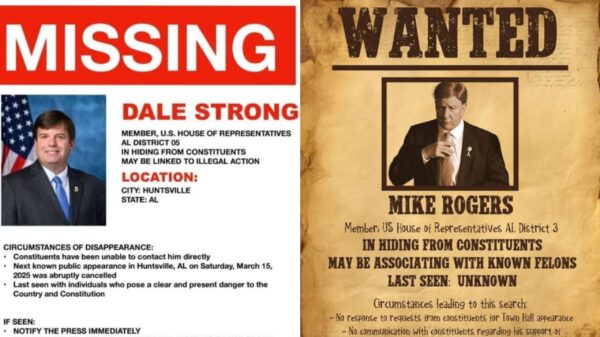By Brandon Moseley
Alabama Political Reporter
On Thursday, August 28, Federal Judge Ralph R. Erickson granted an injunction to states suing the Environmental Protection Agency’s (EPA), and the US Army Corps of Engineers, for an effort to dramatically expand federal power and authority over the American economy, by redefining their authority to include private ponds and drainage ditches. Congresswoman Martha Roby (R-Montgomery) applauded the judge’s ruling in a Monday, August 31, email to constituents.
US Representative Roby wrote: “You’ve seen me talk about the Environmental Protection Agency’s aggressive regulatory overreach that unnecessarily threatens Alabama jobs. And, many of you have shared just how much these regulations affect your businesses such as farms across Southeast Alabama. So I’m pleased to share that last week a federal judge in North Dakota blocked one of the EPA’s most egregious regulatory attempts, the “Waters of the United States” (WOTUS) rule, before it could take effect.”

Attorney General Luther Strange (R) also supports the judge’s injunction.
AG Luther Strange said on Facebook: “Obama’s EPA is dealt a blow as a federal judge partially blocks implementation of Waters of the U.S. rule. A positive first step in the longer court battle to kill this illegal power grab against private property owners.”
The rule, which took effect Friday, Aug. 28, expands the EPA’s jurisdiction on private lands. As a result, previously common farming and forestry practices could require a permit, or be subject to large penalties.
The Director of National Legislative Programs for the Alabama Farmer’s Federation Mitt Walker said: “It’s important that farmers learn about the changes included in this rule, because it will impact everyday farming activities. The only way for farmers to be certain that a feature is classified as a water is to request a jurisdictional determination (JD) from the Army Corps of Engineers.”
Obviously, rivers and creeks are regulated, but under the new rule, ditches, and areas in fields, which are seasonally wet, may be subject to federal regulation.
According to original reporting by Mary Johnson with the Alabama Farmer’s Federation: “Farming practices that could require a permit under the Clean Water Act (CWA) include applying pesticides or fertilizers; grading, plowing or terracing a field; and constructing fences, ditches or ponds. The permit is required whether the area is dry or wet.”
Judge Ralph R. Erickson called the Environmental Protection Agency’s attempt “inexplicable, arbitrary, and devoid of a reasoned process,” and issued an injunction preventing the EPA, and the US Army Corps of Engineers from claiming oversight of millions of acres of land that contain small bodies of water. The clean water act is enforced by the EPA, while wetlands protection is assigned to the Corps of Engineers.
The EPA announced that it will only honor the injunction in the 13 states that were parties to the suit, and will move forward with the rules in the rest of the country. The EPA said “In all other respects, the rule is effective on August 28,” The agencies are, “Evaluating these orders and considering next steps in the litigation.”
Judge Erickson wrote, “The rule asserts jurisdiction over waters that are remote and intermittent waters. No evidence actually points to how these intermittent and remote wetlands have any nexus to a navigable-in-fact water.”
The new rules would effectively give the federal government de-facto zoning authority over the entire country including over current activities. Judge Erickson said, that the change in definition was big enough that the administration should have gone through a full public notice and comment period.
The 13 states that sued are: Alaska, Arizona, Arkansas, Colorado, Idaho, Missouri, Montana, Nebraska, Nevada, New Mexico, North Dakota, South Dakota and Wyoming. Alabama is likely to seek to join the suit and thus gain some temporary protection from the massive federal power grab while the issue is being litigated.
Rep. Roby has been traveling across the district during the Congress’s September recesses: “This past week, I traveled across the district meeting with constituents about important issues facing our communities and nation. We talked about the frustration that so many of you have expressed- and that I share- with the way things are going lately.”
Congresswoman Martha Roby represents Alabama’s Second Congressional District.
Original reporting by Stephen Dinan of the Washington Times, and ALFA’s Mary Johnson contributed to this report.






















































